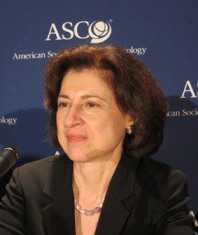ASCO:T-DM1治疗进展期HER2阳性乳腺癌优于卡培他滨+拉帕替尼
2012-06-05 不详 网络
芝加哥(EGMN)——在美国临床肿瘤学会(ASCO)2012年会上报告的EMILIAIII期随机试验表明,抗体-药物共轭新药T-DM1用于进展期HER2阳性乳腺癌比标准治疗更有效,毒性也更小。 在这项试验中,研究者总共招募了991例局部进展或转移性HER2阳性乳腺癌患者,并且所有患者之前都曾接受紫杉烷和曲妥珠单抗治疗。这些患者被平均分组,接受静脉输注T-DM1(又名曲妥珠单抗em
芝加哥(EGMN)——在美国临床肿瘤学会(ASCO)2012年会上报告的EMILIAIII期随机试验表明,抗体-药物共轭新药T-DM1用于进展期HER2阳性乳腺癌比标准治疗更有效,毒性也更小。
在这项试验中,研究者总共招募了991例局部进展或转移性HER2阳性乳腺癌患者,并且所有患者之前都曾接受紫杉烷和曲妥珠单抗治疗。这些患者被平均分组,接受静脉输注T-DM1(又名曲妥珠单抗emtansine),每3周1次,或者口服标准剂量的卡培他滨和拉帕替尼,后者是目前唯一在美国获得批准的用于曲妥珠单抗耐药性HER2阳性转移性乳腺癌的联合用药方案。不准备在疾病进展时进行治疗交叉。
主要研究者、美国杜克大学杜克癌症研究所的Kimberly L. Blackwell博士报告称,该试验的主要疗效终点之一中位无进展生存期在T-DM1组中为9.6个月,而在卡培他滨+拉帕替尼组中仅为6.4个月[危险比(HR):0.65;P<0.0001]。基于这一结果,研究者就总生存期开展了中期分析,这是该试验的另一个主要疗效终点。虽然T-DM1也有效延长了患者的中位总生存期(没有达到vs. 23.3个月;HR:0.62;P<0.0005),但组间差异还是略低于事先定义的终止试验的统计学阈值。
就药物的安全性而言,T-DM1组3级或3级以上血小板减少(12.9% vs. 0.2%)以及天冬氨酸转氨酶(4.3% vs. 0.8%)和丙氨酸转氨酶(2.9% vs. 1.4%)升高的发生率更高;另一方面,卡培他滨+拉帕替尼组腹泻(20.7% vs. 1.6%)、手足综合征(16.4% vs. 0%)和呕吐(4.5% vs. 0.8%)的发生率更高。T-DM1组3级或3级以上不良事件的总发生率大约比联合治疗组低1/3 (41% vs. 57%)。
Blackwell博士补充道,卡培他滨+拉帕替尼组因药物毒性而停止治疗的患者比例也显著高于T-DM1组。她希望这些数据能够支持该药获准用于HER2阳性乳腺癌患者。Blackwell博士还在新闻发布会上表示:“T-DM1是一种全新的HER2阳性乳腺癌治疗方式。我认为这是诸多抗体-药物共轭物中首个能将强效抗癌药物与抗体的靶向给药体系相结合的产品。我相信它将会给HER2阳性转移性乳腺癌患者提供一种非常重要的治疗选择。”
美国纪念斯隆 - 凯特琳癌症中心的Andrew D. Seidman博士在接受采访时评论道:“这是今年最令人振奋的乳腺癌研究进展之一。”他高度称赞该药的作用机制:“可以说这是改变陈旧思维的一种方式。我们手中已经握有一颗灵巧炸弹:我们已经能让曲妥珠单抗靶向作用于癌细胞而发挥一定的毒性作用。这是精准医学,优于现行的标准治疗,即两种口服药物联合使用。”
Seidman博士补充道,T-DM1“可以预防乳腺癌进展,至少在早期分析中能够延长HER2阳性转移性乳腺癌患者的生存期。在纪念斯隆 - 凯特琳癌症中心开展的临床试验中,我们自己也有使用该药的实践经验,它确实有效,也很温和,因此广受欢迎”。
生产商目前正在准备向美国食品药品管理局(FDA)提交T-DM1的上市申请,所申请的适应证很可能与该试验纳入的患者人群类似,即作为晚期HER2阳性乳腺癌患者的一线、二线和三线治疗。
Blackwell博士声明无相关经济利益冲突。该试验由T-DM1的生产商基因泰克公司资助。Seidman博士声明担任了Enzon和惠氏公司的顾问,接受了Celgene、基因泰克和Genomic Health公司提供的酬金。
CHICAGO (EGMN) – T-DM1, an investigational antibody-drug conjugate, is more efficacious and less toxic than standard treatment for advanced HER2-positive breast cancer, finds the randomized phase III EMILIA trial.
In the nearly 1,000 women studied, all of whom had previously received a taxane and trastuzumab, T-DM1 reduced the risk of progression-free survival events by 35% and the risk of death by 38% when compared with capecitabine plus lapatinib, investigators reported at the annual meeting of the American Society of Clinical Oncology.
In addition, the rate of grade 3 or higher adverse events was about one-third lower with T-DM1 than with the combination therapy (41% vs. 57%).
“T-DM1 is a brand new way of treating HER2-positive breast cancer. I think it’s the first of many antibody-drug conjugates to follow that will link a potent anticancer agent to a targeted delivery system of an antibody,” lead investigator Dr. Kimberly L. Blackwell predicted in a press briefing. “I think this will offer a very important therapeutic option for patients with HER2-positive metastatic breast cancer.”
The manufacturer is preparing a filing with the U.S. Food and Drug Administration for approval of T-DM1 that will likely cover use in the same population eligible for the trial, namely, women in the first, second, and third lines of treatment, she added.
“This is one of the most exciting breast cancer stories this year,” Dr. Andrew D. Seidman of the Memorial Sloan-Kettering Cancer Center in New York commented in an interview.
He praised the drug’s mechanism of action, saying, “this is a way to teach an old dog new tricks, so to speak. We have a smart bomb: We have trained trastuzumab to deliver a toxic moiety to cancer cells. It’s precision medicine, and it’s superior to the combination of two oral medications that are the current standard of treatment.”
T-DM1 “keeps breast cancer from progressing and, at least in an early analysis, appears likely to prolong survival in HER2-positive metastatic breast cancer,” Dr. Seidman added. “So this is, for me, good news. I’ve had hands-on experience with the drug in our own clinical trials at Memorial Sloan-Kettering. It’s kind and gentle. So it’s very welcome.”
The investigators enrolled in EMILIA 991 women with locally advanced or metastatic HER2-positive breast cancer that had been previously treated with a taxane and trastuzumab.
They were assigned evenly to intravenous T-DM1 (also known as trastuzumab emtansine) once every 3 weeks, or to oral, standard-dose capecitabine and lapatinib, currently the only U.S. approved combination for trastuzumab-refractory HER2-positive metastatic breast cancer. There was no planned cross-over at progression.
Median progression-free survival, one of the trial’s primary efficacy end points, was 9.6 months with T-DM1, compared with 6.4 months with capecitabine-lapatinib (hazard ratio, 0.65; P less than .0001). These findings triggered an interim analysis of overall survival, the trial’s other primary efficacy end point, according to Dr. Blackwell, who is a professor of medicine and assistant professor of radiation oncology at Duke Cancer Institute at Duke University, Durham, North Carolina.
Although T-DM1 also improved median overall survival (not reached vs. 23.3 months; hazard ratio, 0.62; P less than .0005), the difference fell just short of the predefined statistical threshold for stopping the trial.
T-DM1 was associated with higher rates of grade 3 or worse thrombocytopenia (12.9% vs. 0.2%) and elevations of aspartate aminotransferase (4.3% vs. 0.8%) and alanine aminotransferase (2.9% vs. 1.4%). On the other hand, capecitabine-lapatinib was associated with higher rates of diarrhea (20.7% vs. 1.6%), hand-foot syndrome (16.4% vs. 0%), and vomiting (4.5% vs. 0.8%).
Patients given capecitabine-lapatinib were significantly more likely to discontinue treatment because of toxicity, according to Dr. Blackwell.
“We would hope that these data would support the availability of the drug for patients faced with HER2-positive breast cancer,” she concluded.
Click here to view a video interview with Dr. Blackwell.
Dr. Blackwell disclosed no relevant conflicts of interest. The trial was sponsored by Genentech, manufacturer of T-DM1. Dr. Seidman disclosed that he is a consultant to Enzon and Wyeth, and receives honoraria from Celgene, Genentech, and Genomic Health.
本网站所有内容来源注明为“梅斯医学”或“MedSci原创”的文字、图片和音视频资料,版权均属于梅斯医学所有。非经授权,任何媒体、网站或个人不得转载,授权转载时须注明来源为“梅斯医学”。其它来源的文章系转载文章,或“梅斯号”自媒体发布的文章,仅系出于传递更多信息之目的,本站仅负责审核内容合规,其内容不代表本站立场,本站不负责内容的准确性和版权。如果存在侵权、或不希望被转载的媒体或个人可与我们联系,我们将立即进行删除处理。
在此留言












#ASC#
77
Please keep thrwonig these posts up they help tons.
173
#进展期#
88
#卡培他滨#
64
#HER2阳性#
0
#拉帕替尼#
74